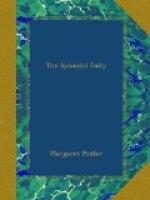“That goes better, hein? This Olga—she had not reflected sufficiently. It was too late for the truth to do good; it could only pain and grieve you.”
“Yes,” said Diana. “It is too late now. . . . I’ve paid for my ignorance with my happiness—and Max’s,” she added in a lower tone. She looked across at Baroni with sudden resentment. “And you—you knew!” she continued. “Why didn’t you tell me? . . . Oh, but I can guess!”—scornfully. “It suited your purpose for me to quarrel with my husband; it brought me back to the concert platform. My happiness counted for nothing—against that!”
Baroni regarded her patiently.
“And do you regret it? Would you be willing, now, to give up your career as a prima donna—and all that it means?”
A vision rose up before Diana of what life would be denuded of the glamour and excitement, the perpetual triumphs, the thrilling sense of power her singing gave her—the dull, flat monotony of it, and she caught her breath sharply in instinctive recoil.
“No,” she admitted slowly. “I couldn’t give it up—now.”
An odd look of satisfaction overspread Baroni’s face.
“Then do not blame me, my child. For haf I not given you a consolation for the troubles of life.”
“I need never have had those troubles to bear if you had been frank with me!” she flashed back. “You—you were not bound by any oath of secrecy. Oh! It was cruel of you, Maestro!”
Her eyes, bitterly accusing, searched his face.
“Tchut! Tchut! But you are too quick to think evil of your old maestro.” He hesitated, then went on slowly: “It is a long story, my dear—and sometimes a very sad story. I did not think it would pass my lips again in this world. But for you, who are so dear to me, I will break the silence of years. . . . Listen, then. When you, my little Pepperpot, had not yet come to earth to torment your parents, but were still just a tiny thought in the corner of God’s mind, I—your old Baroni—I was in Ruvania.”
“You—in Ruvania?”
He nodded.
“Yes. I went there first as a professor of singing at the Borovnitz Conservatoire—per Bacco! But they haf the very soul of music, those Ruvanians! And I was appointed to attend also at the palace to give lessons to the Grand Duchess. Her voice was only a little less beautiful than your own.” He hesitated, as though he found it difficult to continue. At last he said almost shyly: “Thou, my child, thou hast known love. . . . To me, too, at the palace, came that best gift of the good God.”
He paused, and Diana whispered stammeringly:
“Not—not the Grand Duchess?”




